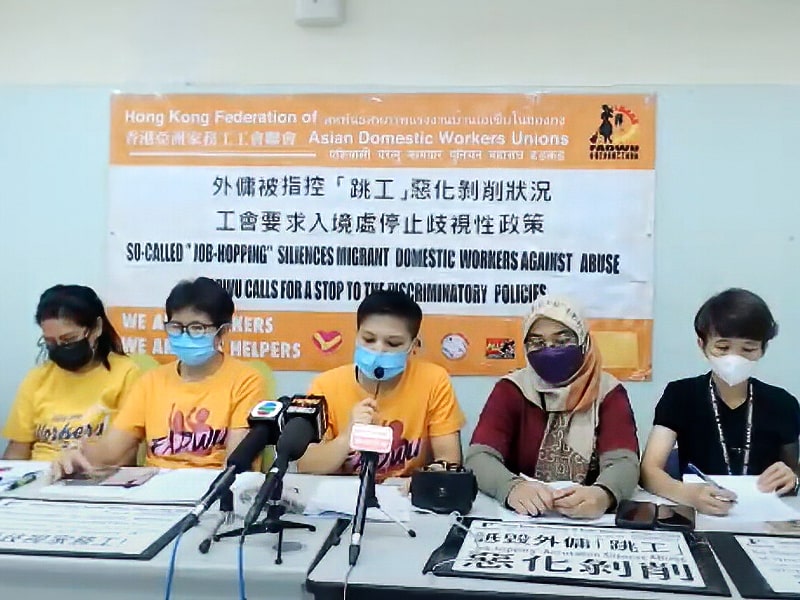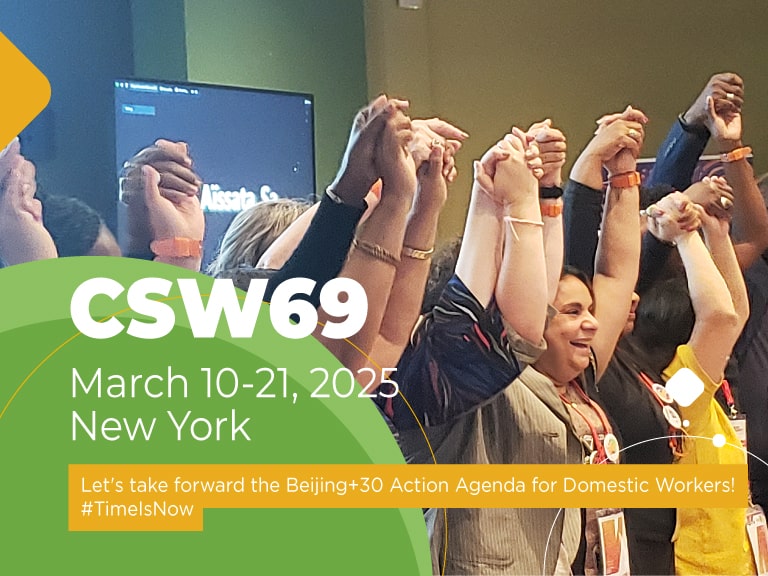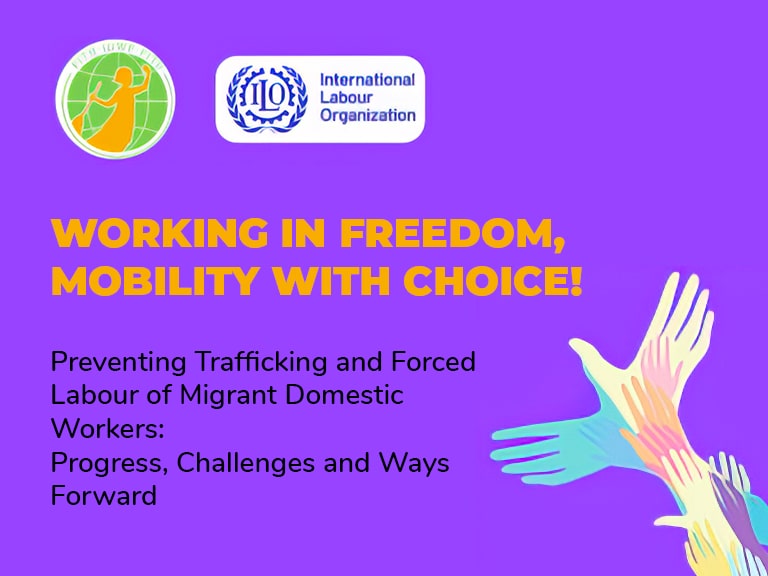- This event has passed.
Hong Kong: alleged “Job-hopping” silences abuse, FADWU calls for a stop to the discriminatory policies
On 7 Aug 2022, FADWU organizes a press conference in response to the Immigration Department of Hong Kong alleging migrant domestic workers on “Job-hopping”
Alleged “Job-hopping” Silences Migrant Domestic Workers Against Abuse, FADWU Calls for a Stop to the Discriminatory Policies
The Immigration Department (ImmD) proactively combating so-called “job-hopping” has effectively silenced workers against abuse and has facilitated the exploitation of migrant domestic workers (MDWs), a survey done by the Hong Kong Federation of Asian Domestic Workers Unions (FADWU) suggests.
(For the video recording of the Press Conference in Bhs Indonesia, please click HERE)
In 2021, the number of visa rejections of MDWs based on ImmD’s ground of “job-hopping” reached nine times more than the previous year. (2,833 in 2021 compared to 319 in 2020, The 2021 number of visa rejections is nearly half of 5,844 visa application cases referred to the Special Duty Team (SDT) of ImmD who investigates on suspicion of “job-hopping”). This year the situation only gets worse. In the first six months of 2022, 1,052 (72%) out of 1,454 applications “investigated by the SDT” were rejected.
Migrant domestic workers leaders of FADWU held a press conference today (7 August 2022) to present survey findings and respond to the so-called “job-hopping” accusations from Immigration Department.
From November 2021 to May 2022, FADWU gathered 238 valid responses from Filipino and Indonesian migrant domestic workers. Their working experience in Hong Kong ranged from 4 months to 34 years.
46% of the respondents stated that they had experienced at least one kind of abuse throughout their work as domestic workers in Hong Kong. The abuses include extremely long working hours (up to 17-19 hours per day), non-contractural working demands, insufficient food, no proper place to sleep, no or little day off, and verbal/mental/sexual abuse. Among them, 62% of the respondents didn’t terminate the contract. The number one concern was that they worried that Hong Kong Immigration would accuse them of “job-hopping” and would not give them a visa next time (72%). The other worries include that the agency/employer confiscated their passport. They were told or even threatened by the agency not to break the contract. They are in debt-bondage, needing to pay excessive agency fees. Meanwhile, they have to support their family financially. They are also uncertain if they will find a worse employer or cannot find a new job after breaking the contract. (click HERE for full survey report)
91% of the respondents express that the ImmD’s accusation of “job-hopping” is unfair to workers.
“We consider the ImmD accusations very unfair, discriminatory and demeaning.” Ratih, the chairperson of UUDW and an Indonesian leader of FADWU, said. “From my experience, migrant domestic workers do not want to change employers unless they have to. Those forced to change employers usually face poor working conditions and treatment. However, the Hong Kong Government deliberately turns a blind eye. Instead, it blames migrant domestic workers when the contract is terminated – they seek to escape the abuses by terminating the contract. In many more cases, workers are forced to sign resignation letters when employers terminate them. While the employers can change as many workers as they want without facing any consequences.”
ImmD only accepts contract termination by MDWs under “exceptional circumstances”. That is termination owing to the original employer’s transfer, migration, death or financial reasons, or where there is evidence that the MDW has been abused or exploited. Then the worker can change employers within a two-year contract period in Hong Kong. Otherwise, workers’ contract termination will be considered “job-hopping”, and workers’ visa applications for new employers in Hong Kong will be rejected. So, the workers must return to their home countries, find a new employer, pay another big agency fee and apply for a visa again.
Yet, FADWU has received cases of workers who terminated the contract for valid reasons. For example, some workers have submitted evidence of abuse. Still, the ImmD has never contacted the worker to investigate the abuse before rejecting the worker’s visa application. In one case, the worker was rejected after appealing three times. Another worker was laid off due to redundancy. Her visa application with a new employer was rejected without a concrete reason. In another situation, the worker terminated the contract and returned to Indonesia because of illness, but when she applied again after 8 months, her visa was rejected because her former employer wrote a furious letter to ImmD.
“Immigration only listens to employers, not listens to both sides. That is unfair.” Said Maria Ana Gomeceria, a Filipino leader of FADWU’s affiliate, the PLU. “Immigration department should also look into work’s side as to why domestic workers are breaking contracts with employers.”
FADWU has sent an enquiry to ImmD asking them to disclose the policies behind the “job-hopping” accusation and what is the mechanism of screening abuse. Yet, ImmD’s replies provide no details on its guidelines and policies on its “investigation”. Instead, it biasedly claims that “job-hopping undermines employment relationships and leads to unfairness and inconvenience to the employers.”
“Immigration Department only cares about the ‘inconvenience’ of the employer and doesn’t care about the rights and well-being of migrant domestic workers.” exclaimed Jec Sernande, Secretary of FADWU. “They accused us of abuse in changing employers but, in fact, the employers are abusing the system to kick away workers whenever they feel like to.”
ImmD claims there is a shortage of workers during the COVID-19 pandemic. However, instead of facilitating visa applications to help more employers to hire an MDW, the ImmD rejects more visa applications and worsen the shortage. As a result, employers and MDWs bear more travel and agency costs.
“So-called ‘job hopping’ is a fabricated problem of the Immigration Department’s making.” Dang, chairperson of FADWU said. “Why are only migrant domestic workers accused of job-hopping? While other types of migrants can change their jobs easily, let alone employers can change as many workers as they want. Finding better employment is a right to everyone.”
The issue is not that MDWs are allegedly “hopping jobs”. It is that the Immigration Department (and the HKSAR government) discriminates against MDWs by denying them the right to change employers. As a result, many MDWs are trapped in abusive employment situations that they feel they cannot escape.
FADWU demands:
- ImmD to stop the discriminatory visa policies immediately and provide access to justice for MDWs who experience abusive employment.
- EOC to look into the discrimination against women and ethnic minorities by rejecting working visas.
- Interdepartmental cooperation among the Labour Department, ImmD and police to set up a screening and referral mechanism when MDWs report abuses and exploitations.
Media Contact: [email protected]








